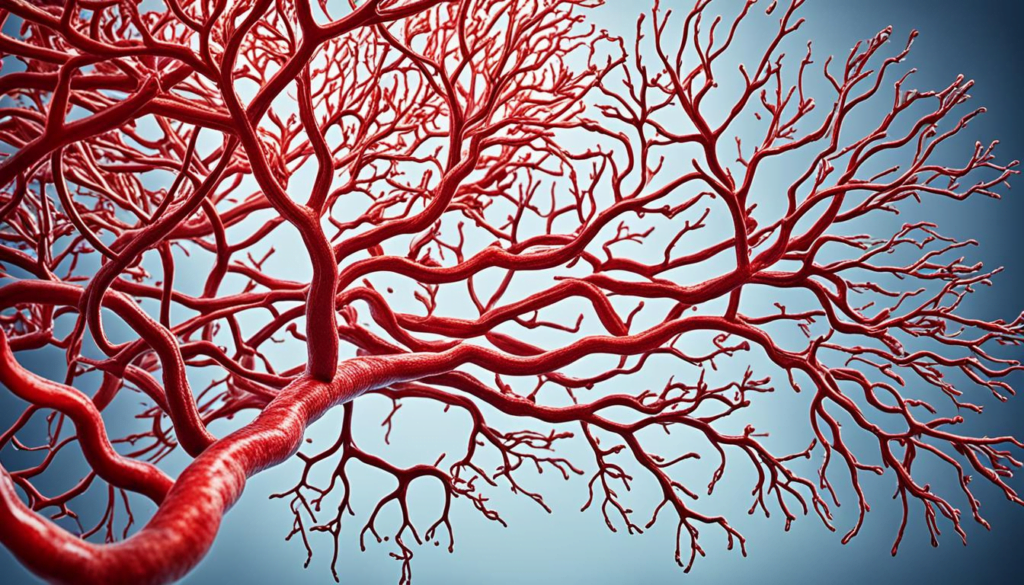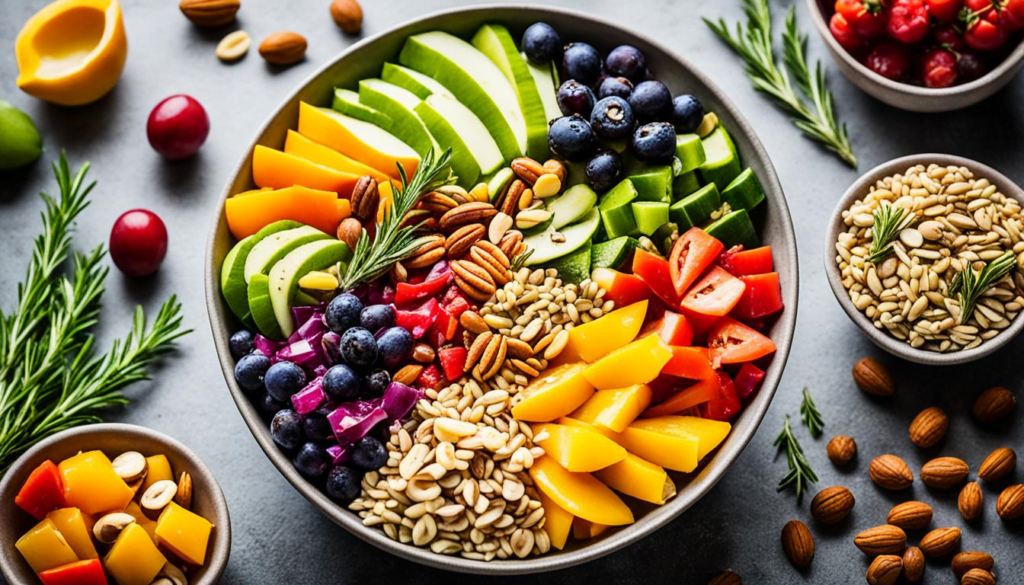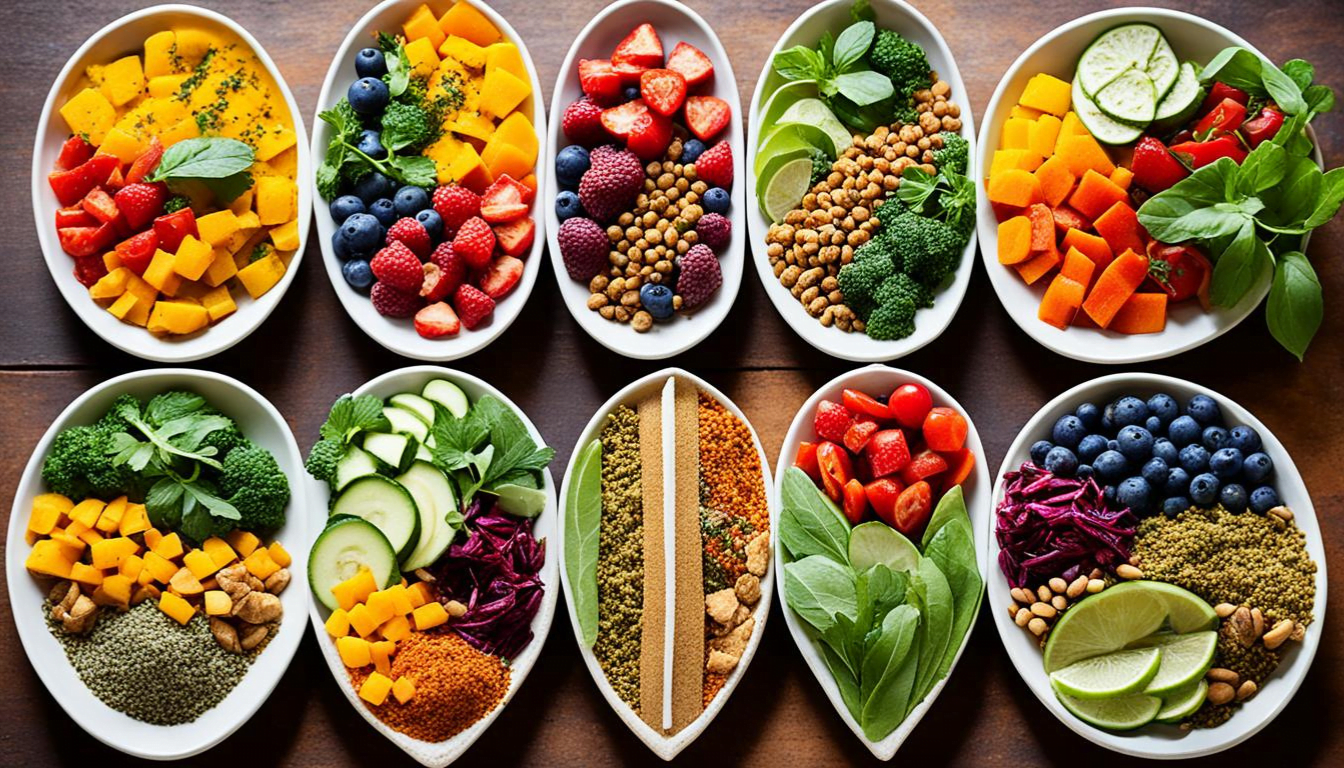High cholesterol is a big risk for heart problems like heart attacks and strokes. Over 95 million Americans have high cholesterol. Many turn to statins for help, but some look at Ayurvedic medicine too. Ayurveda is an old system from India that focuses on diet, behaviour, supplements, and detox to keep us healthy.
In this article, we’ll see how Ayurveda can help lower blood pressure and cholesterol without drugs.
Table of Contents

Key Takeaways
- Ayurveda offers a natural way to manage high blood pressure and cholesterol.
- It’s important to understand Ayurveda’s view on cholesterol and its effects on health.
- Changing your diet to eat more whole, plant-based foods can help lower cholesterol, says Ayurveda.
- Herbs like Arjuna and Triphala are used in Ayurveda to control blood pressure and cholesterol.
- Combining Ayurvedic practices with modern medicine can improve heart health.
Understanding Cholesterol and Blood Pressure from an Ayurvedic Perspective
In Ayurvedic medicine, cholesterol isn’t directly talked about. But, meda dhatu (lipid tissue) is key to understanding cholesterol balance. Meda dhatu is one of the seven dhatus (body tissues) and keeping it balanced is crucial for healthy cholesterol.
The Ayurvedic view on cholesterol highlights the need for balanced agni (digestive fire). This balance is essential for managing meda dhatu and lipid metabolism. When agni is balanced, the body makes the right amount and quality of cholesterol. This supports the tissues and overall health. But, agni imbalances can cause problems with meda dhatu, leading to unhealthy cholesterol levels.
The Role of Meda Dhatu (Lipid Tissue) in Cholesterol Balance
Meda dhatu is key for making, moving, and storing lipids, like cholesterol. Ayurveda says having the right balance of meda dhatu is key for healthy cholesterol. When meda dhatu is balanced, the body can manage cholesterol well, preventing too much build up.
The Importance of Balanced Agni (Digestive Fire) for Healthy Lipid Metabolism
Ayurveda says balanced agni is crucial for managing meda dhatu and cholesterol. Agni is the force that helps digest, metabolize, and change nutrients in the body. With balanced agni, the body can handle lipids well, making sure cholesterol is made and used right.
But, agni imbalances can mess with lipid metabolism. This can lead to unhealthy cholesterol levels. By fixing these imbalances with Ayurvedic methods, people can get their lipid metabolism back in balance.

“Balanced agni is the key to regulating meda dhatu and lipid metabolism. When agni is in harmony, the body produces the right amount and quality of cholesterol to nourish the tissues and support overall well-being.”
Ayurvedic Dietary Modifications for Lowering Cholesterol and Blood Pressure
Ayurvedic practices offer a holistic way to manage cholesterol and blood pressure. They focus on dietary changes for balance. This balance is key to our health.
Promoting Whole, Unprocessed Plant-Based Foods
Ayurvedic diets push for whole, unprocessed plant-based foods. These foods are full of fibre, antioxidants, and other good stuff. They help keep cholesterol and blood pressure in check. An ayurvedic diet for cholesterol and blood pressure suggests eating:
- Leafy greens
- Brightly coloured fruits and vegetables
- Whole grains like quinoa, millet, and brown rice
- Legumes, nuts, and seeds
Choosing these whole plant-based foods helps with healthy fat levels and heart function.
Restricting Unhealthy Fats and Processed Foods
Ayurvedic ideas also stress the need to limit unhealthy fats and processed foods. These can raise cholesterol and blood pressure. Ayurvedic diets suggest eating less of:
- Saturated and trans fats in fried foods, baked goods, and processed meats
- Refined carbs and added sugars in processed snacks and drinks
- Too much salt, which can make high blood pressure worse
By eating fewer unhealthy foods and more whole plant-based foods, you help your body keep cholesterol and blood pressure healthy.

Adding these Ayurvedic eating tips to your life can help manage cholesterol and blood pressure naturally. Making smart food choices and using ancient wisdom can lead to better heart health and overall well-being.
Ayurvedic Herbal Remedies for Cholesterol and Blood Pressure Management
Ayurvedic medicine uses herbs and blends to manage cholesterol and blood pressure. These natural remedies aim to fix the root causes of heart health issues.
Arjuna (Terminalia arjuna) and Other Ayurvedic Herbs
Arjuna (Terminalia arjuna), a tree from India, is famous for lowering cholesterol. Studies show it cuts down total and LDL (bad) cholesterol and boosts HDL (good) cholesterol. Its compounds, like flavonoids and tannins, help balance cholesterol levels.
Other herbs like Guggulu, Ashwagandha, and Amla also help with cholesterol and blood pressure. They have compounds that can improve heart health in different ways.
Triphala and Mustadi Ghanavti: Powerful Herbal Formulations
Herbal mixes like Triphala and Mustadi Ghanavti are great for cholesterol and blood pressure. Triphala uses three fruits that can lower total and LDL cholesterol. Mustadi Ghanavti combines herbs like Arjuna, Guggulu, and Haritaki to support heart health.
These blends tackle many factors that affect cholesterol and blood pressure. Adding them to your health routine can help manage cardiovascular risks.

“Ayurvedic herbs and formulations have shown promising results in managing cholesterol and blood pressure, providing a natural and holistic approach to cardiovascular health.”
Lowering Blood Pressure and Cholesterol with Ayurveda
Using Ayurveda can be a natural way to handle high blood pressure and high cholesterol. Studies show it’s good for your heart health.
The Benefits of Dietary Changes and Lifestyle Modifications
Ayurvedic diets focus on whole, plant-based foods and cut out unhealthy fats and processed foods. This helps lower cholesterol. Eating more fruits, veggies, whole grains, legumes, and healthy fats is key.
It’s not just about food. Stress reduction, exercise, yoga, and breathing exercises help too. These changes can lower bad cholesterol and raise good cholesterol. This is good for your heart.
| Ayurvedic Dietary Recommendations | Ayurvedic Lifestyle Practices |
|---|---|
| Emphasis on whole, unprocessed plant-based foods Restriction of unhealthy fats and processed items Incorporation of healthy fats (e.g., ghee, nuts, seeds)Inclusion of fibre-rich foods (e.g., fruits, vegetables, whole grains) | Stress reduction techniques (e.g., meditation, mindfulness) Regular physical activity (e.g., yoga, walking, swimming) Breathing exercises (e.g., pranayama) Adequate sleep and rest |
By using this holistic Ayurvedic approach, you can lower your blood pressure and cholesterol. This helps your heart and overall health.

“Ayurveda’s emphasis on balance and harmony in the body, mind, and spirit can be a powerful ally in managing cardiovascular health conditions like high cholesterol and hypertension.”
The Role of the Liver in Regulating Cholesterol
In Ayurveda, the liver (yakrit) is key to keeping cholesterol levels healthy. It makes most of the body’s cholesterol and checks toxins before they spread in the blood. If the liver gets too full of toxins (ama), it can’t balance well. This messes with the 13 digestive fires (agnis) needed for good lipid metabolism.
How Toxins (Ama) Affect Lipid Metabolism and Cholesterol Levels
Toxins (ama) in the liver can really mess with lipid metabolism and cholesterol levels. If the liver can’t work right, it makes bad cholesterol. This can make cholesterol levels go up or down. It’s bad news for heart health.
“Addressing toxin accumulation in the liver is an essential aspect of Ayurvedic cholesterol management.”
Ayurvedic experts know a clean liver is key for controlling cholesterol. They work to fix toxin buildup to boost the liver’s agni (digestive fire). This helps the liver work better at breaking down fats, keeping cholesterol in check.
Knowing how the liver helps control cholesterol and how toxins affect it is crucial in Ayurveda. By fixing these imbalances, Ayurvedic treatments and lifestyle changes can help the liver work right. This supports heart health and overall wellness.
Ayurvedic Remedies for Hypertension
Ayurveda is an ancient holistic system that offers natural remedies for high blood pressure. By adding simple Ayurvedic drinks and foods to your daily routine, you can help manage your blood pressure. Let’s look at some effective Ayurvedic solutions for hypertension.
Soothing Ayurvedic Drinks for Blood Pressure
Adding certain herbs and spices to your drinks is a simple way to manage high blood pressure. Try mixing coriander and cardamom with peach juice, or blend moong dal soup with cilantro, cumin, and turmeric. A drink made with honey, apple cider vinegar, and warm water is also great for balancing blood pressure.
Ayurvedic Foods for Regulating Blood Pressure
Ayurveda suggests eating certain foods to help control hypertension. Coconut water is a natural diuretic that can help with blood pressure. Cucumber raita and watermelon with cardamom and coriander are also good for lowering blood pressure.
It’s key to avoid foods that can make high blood pressure worse, like salty, fatty, fried, and spicy foods. Making these dietary changes can help keep your blood pressure healthy.
“Ayurveda emphasizes the importance of a balanced and nourishing diet for overall health, including the management of hypertension.”
Using Ayurvedic remedies like these drinks and foods can help lower and keep your blood pressure healthy. Remember, Ayurveda suggests a holistic approach. So, combine these dietary changes with other lifestyle changes for the best results.
Integrating Ayurveda with Modern Medicine
Managing cholesterol and blood pressure can be easier when we use Ayurveda and modern medicine together. This approach combines the best of both worlds. It uses Ayurveda’s holistic wisdom and modern medicine’s precision.
Ayurvedic remedies and changes in lifestyle can help control cholesterol and blood pressure. But, it’s important to work with both Ayurvedic experts and doctors. This ensures a safe and effective treatment plan.
Some Ayurvedic herbs might affect medicines you’re already taking. So, talking to your doctors is key. This way, Ayurvedic and modern treatments work together well. It helps you get the best care for your health.
Ayurveda looks at how to keep your digestive fire strong and support your lipid tissue health. When we mix this with modern medicine, we get a better way to manage cholesterol and blood pressure. This leads to a healthier life.
- Ayurvedic remedies can work well with modern medicine to help with cholesterol and blood pressure.
- It’s important to talk to both Ayurvedic experts and doctors to make sure everything works together safely.
- Talking openly with doctors is key to handle any issues with Ayurvedic herbs and your other medicines.
- Using Ayurveda and modern medicine together can lead to better health and a more balanced approach to wellness.
“The integration of Ayurvedic and modern medical practices offers a synergistic approach to addressing complex health challenges, leading to improved outcomes and a more personalized path to wellness.”
By using Ayurveda and modern medicine together, we can make the most of both. This way, we can better manage cholesterol and blood pressure. It helps us take control of our health for the long term.
Potential Risks and Precautions with Ayurvedic Remedies
Ayurvedic practices are often seen as safe and natural. However, it’s important to know that herbal supplements can have risks. This is true for Ayurvedic remedies aimed at managing cholesterol and blood pressure. It’s key for patients to know about possible side effects and interactions.
Side effects are a big concern with Ayurvedic remedies. Some herbs and mixes can cause diarrhea, stomach cramps, hallucinations, weakness, skin rashes, and headaches. They might also affect medications like blood thinners, blood pressure drugs, and antibiotics.
Before using Ayurvedic remedies, it’s vital to talk to healthcare providers. This is especially true if you’re already on other medications. Working together can help spot any possible problems. This way, you can make a safer and more tailored treatment plan.
Don’t worry if Ayurvedic diets seem too strict. For lowering cholesterol, a balanced diet with whole, plant-based foods is often better. This approach helps fix body imbalances for lasting results.
Potential Risks and Precautions with Ayurvedic Remedies for Cholesterol and Blood Pressure
- Possible side effects of Ayurvedic herbs and formulations, such as diarrhea, abdominal cramping, hallucinations, weakness, skin rashes, and headaches
- Potential interactions between Ayurvedic remedies and commonly prescribed medications, including blood thinners, blood pressure medications, and antibiotics
- Importance of consulting healthcare providers before incorporating Ayurvedic remedies, especially for individuals already taking prescribed medications
- Caution regarding overly restrictive Ayurvedic dietary suggestions, as a balanced and sustainable approach may be more effective
Knowing about these risks and precautions helps people make smart choices about using Ayurvedic remedies. This ensures a safe and effective way to manage cholesterol and blood pressure. It also supports overall health and well-being.
Lifestyle Changes for Holistic Cholesterol and Blood Pressure Management
Ayurvedic treatments are great, but lifestyle changes can also help lower cholesterol and blood pressure. These changes work well with Ayurvedic remedies for a full health plan.
Eating more fibre is a big step. Foods like beans, fruits, flax, and oats are full of soluble fibre. This fibre type lowers LDL (bad) cholesterol by making it less absorbable in the body.
Choosing a diet rich in whole, unprocessed foods is also key. These foods are naturally low in bad fats. This helps keep cholesterol and blood pressure in check.
Staying at a healthy weight is crucial. Regular exercise does more than just help with cholesterol and blood pressure. It boosts your heart health too. Walking, swimming, or cycling are great activities.
Following a Mediterranean diet can also help. It focuses on healthy fats, whole grains, and lots of fruits and veggies. Quitting smoking and taking supplements like curcumin and omega-3 fatty acids can also help.
Remember, your genes can affect your cholesterol levels. So, a full plan with lifestyle changes, Ayurvedic remedies, and doctor advice is best for managing cholesterol and blood pressure.
“Adopting a balanced, evidence-based approach that combines Ayurvedic wisdom and lifestyle modifications can be a powerful way to holistically manage cholesterol and blood pressure.”
Conclusion
Ayurvedic medicine offers a unique way to handle cholesterol and blood pressure. It focuses on balancing the body’s lipid tissue and digestive fire. This approach helps make healthy cholesterol.
Studies show that Ayurvedic diets, herbal remedies, and lifestyle changes can lower bad cholesterol and blood pressure. These methods have shown promise in managing health.
But, it’s important to mix Ayurveda with modern medicine. This ensures it’s safe and works well. By doing this, people can improve their heart health and overall well-being.
Using Ayurveda with modern medicine can lead to better health. It combines the best of old and new to help manage cholesterol and blood pressure. This way, people can keep their hearts healthy and feel better overall.
FAQ
What is the role of Meda Dhatu (Lipid Tissue) in cholesterol balance according to Ayurveda?
Ayurveda talks about Meda Dhatu, not cholesterol directly. Meda Dhatu is vital for keeping cholesterol levels healthy. It’s part of the seven body tissues. Keeping Agni (digestive fire) balanced is key to managing Meda Dhatu and cholesterol.
How does Ayurveda view the importance of Agni (Digestive Fire) for healthy lipid metabolism?
Ayurveda says a balanced Agni is crucial. It helps make the right amount and quality of cholesterol. This keeps the body healthy. If Agni is off balance, it can mess with cholesterol production.
What dietary modifications does Ayurveda recommend for lowering cholesterol and blood pressure?
Ayurveda suggests eating whole, plant-based foods and avoiding unhealthy fats and processed foods. Cutting down on calories and choosing plant-based foods over processed ones helps lower cholesterol and blood pressure.
What are some of the Ayurvedic herbal remedies that can help manage cholesterol and blood pressure?
Arjuna, a tree from India, lowers total and LDL (bad) cholesterol and raises HDL (good) cholesterol. Triphala and Mustadi Ghanavti are also Ayurvedic mixes that help lower cholesterol.
How can Ayurvedic lifestyle modifications help lower blood pressure and cholesterol?
Stress reduction, exercise, yoga, and breathing exercises help lower bad cholesterol and raise good cholesterol. This holistic approach targets diet and lifestyle for better heart health.
What is the role of the liver (Yakrit) in regulating cholesterol levels according to Ayurveda?
The liver is key in Ayurveda for controlling cholesterol levels. It makes cholesterol and filters toxins before they enter the blood. Too many toxins can harm the liver’s function, affecting lipid metabolism.
What are some Ayurvedic remedies for managing high blood pressure (hypertension)?
For high blood pressure, try peach juice with coriander and cardamom, moong dal soup with cilantro, cumin, and turmeric. Also, mix honey, apple cider vinegar, and hot water. Coconut water, cucumber raita, and watermelon with cardamom and coriander are good for blood pressure.
How can Ayurvedic and modern medical approaches be integrated for effective cholesterol and blood pressure management?
Work with both Ayurvedic experts and doctors for a full and safe plan. Some Ayurvedic herbs might affect medicines, so talk to your doctor. Mixing Ayurveda with modern medicine helps manage cholesterol and blood pressure well.
What are the potential risks and precautions to consider with Ayurvedic remedies for cholesterol and blood pressure?
Ayurvedic remedies can cause diarrhea, stomach cramps, and other side effects. They might also interact with medicines like blood thinners. Always talk to a doctor before trying new remedies, especially if you’re on other treatments.
What other evidence-based strategies can be effective in reducing cholesterol and blood pressure levels?
Good strategies include eating more fibre, losing weight, and eating more plants. Regular exercise, a Mediterranean diet, quitting smoking, and supplements like curcumin and omega-3 fatty acids also help.





